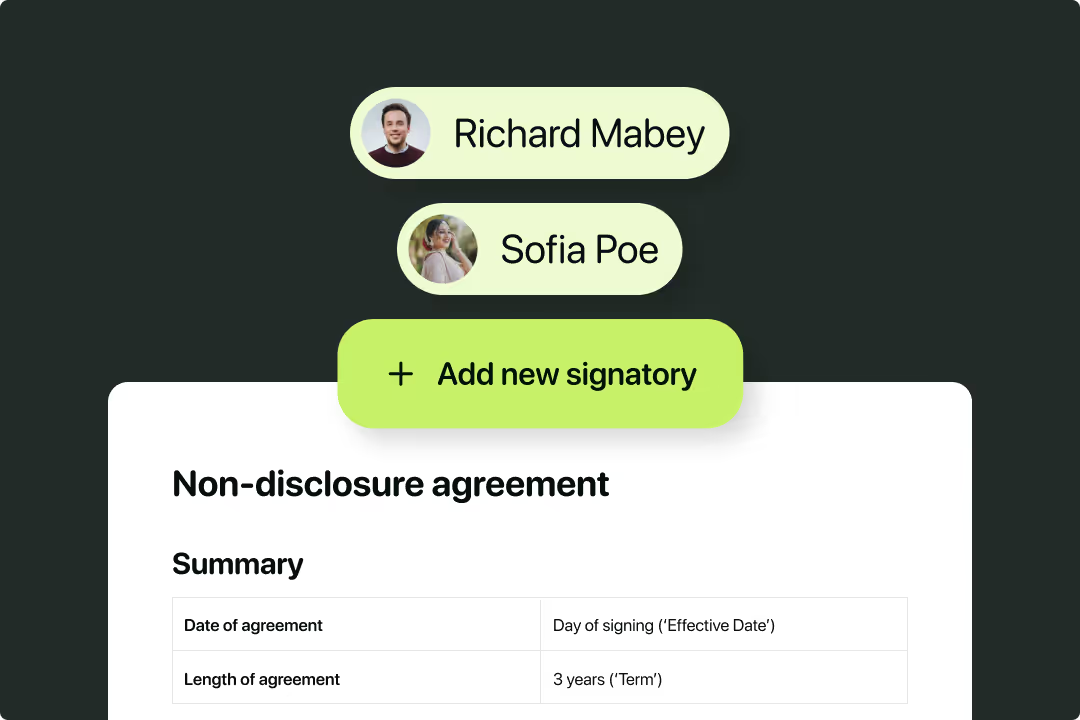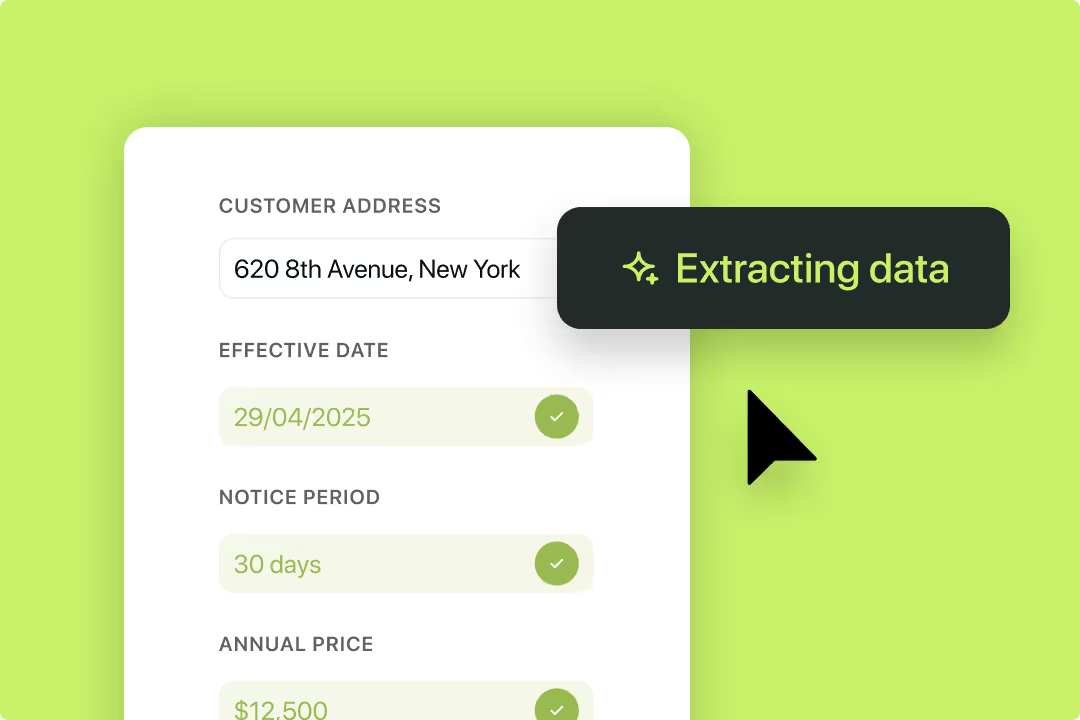Solutions
Customer Support
Resources
Manual contract tracking is outdated, risky, and impossible to scale.
Spreadsheets, calendar reminders, and scattered storage just don’t cut it anymore – especially when contract volumes start to grow without the headcount to match.
Whether you’re an in-house legal team, legal ops professional, or business leader, this guide is your roadmap to smarter contract monitoring. We’ll walk through:
Contract monitoring is the process of tracking contracts to ensure parties are meeting the agreed terms and conditions.
That means keeping tabs on obligations, deadlines, and performance metrics – and making sure they’re actually met.
You might also hear it being referred to as contract tracking, contract obligation management or even post-signature contract management. No matter what you call it, contract monitoring typically includes:

76 per cent of contract professionals report major inefficiencies in contract processes. Much of that risk lies after the contract is signed.
While creation and negotiation are high-visibility stages, the post-signature phase often slips through the cracks. Without proper monitoring, you risk missed obligations, revenue loss, and increased exposure, just when you think the hard work is done.
Effective contract monitoring means greater visibility and better alignment with the overall business strategy. Five key reasons you should be monitoring your contracts post-signature are:
If you monitor contracts, you know whether or not you’re fulfilling contractual obligations. It’s as simple as that. Contract monitoring verifies that all parties adhere to terms and conditions, despite any changing regulations and internal policies.
Instead of responding to problems after they happen, you prevent them. Contract monitoring enables legal and business teams to catch missed renewals or obligations early. Without it, you face exposure to financial penalties, missed revenue opportunities, and even reputational damage.
In regularly assessing the progress and quality of work, contract tracking can also expose any inefficiencies within legal and commercial teams' existing contract workflow. When you spot slow stages, you can make improvements where they’ll have the most impact.
Contract tracking also contributes to maintaining successful relationships with customers. For example, they are more likely to renew a contract if you have met all terms and conditions and flagged a renewal early. Doing a good job buys you goodwill.
By using data to forecast growth and mitigate blockers, monitoring contracts helps businesses look to the future and project their growth more accurately.
Since monitoring large contract volumes is a hefty task, it’s common for multiple stakeholders to be responsible for contract monitoring. These stakeholders typically include:

Monitoring contracts aimlessly is as bad as not monitoring them at all. The first step for any effective contract tracking is to understand the datapoints and metrics you want to look at.
Not all contracts require the same level of scrutiny but some of the key points and process-related metrics you need to monitor include:
Despite the importance of contract monitoring, many businesses still rely on outdated methods like shared drives or inboxes to store contracts, excel spreadsheets to track dates and calendar reminders to flag key milestones.
The result is a disjointed, time-intensive and error-prone process where critical details are easy to miss. Renewal dates can pass without action, deadlines are missed and locating causes or agreements can be a nightmare. In fact, contract professionals spend up to two hours searching for a single clause in a contract.
As contract volume grows, so does the chaos. Manual systems simply don’t scale, and they leave too much to chance. The best way to make your contract monitoring process more efficient is to automate the heavy lifting. This can be achieved by adopting contract management software with contract reporting as a feature.
There are a few ways in which businesses can monitor their contracts effectively, and what they choose to do will depend on their specific goals. We’ve detailed a few typical steps to effective contract monitoring below.
Monitoring contracts aimlessly is often as bad as not monitoring them at all. The first and most important step to contract monitoring is recognizing what exactly it is that you want to monitor, and why.
Most businesses will want to monitor the performance of contractual obligations to ensure that contracts are being fulfilled on time and to the correct standard.
Meanwhile, some businesses will also want to monitor how long contracts stay in each stage of the contract lifecycle so that they can understand how to speed up contract workflows.
Others will want to monitor the data contained within contracts to gain an insight into understanding the contents and nature of contracts.
Regardless of what your objectives are when deciding to monitor your contracts, it’s important to establish these before setting up a contract monitoring process or system. This is because some processes will serve different objectives better than others.

Once you’ve established precisely what it is that you want to track within your contracts, it’s important to decide who is going to be responsible for monitoring these things.
While some contract monitoring platforms can help to automate the process, it’s still important to decide who is going to be held accountable for tracking the data contained within reports, and who is going to manage the monitoring process.
As we mentioned previously, contract monitoring can be carried out by a wide range of different stakeholders. However, it’s important to provide clarity about exactly which aspects of the monitoring are the responsibility of which stakeholders to ensure the contract monitoring process is thorough and accurate.
Too many legal teams in early-stage businesses understand the pain of uncentralized contracts. Contracts, once signed, are typically scattered across shared drives with inconsistent naming conventions and incomplete excel spreadsheets for contract data.
When it comes to monitoring these contracts, it’s hard to know where to begin and what to review. Fortunately, these problems can be resolved by investing in better contract storage or a centralized contract repository.

By centralizing your contracts and their data, you can ensure that you’re monitoring the right contracts for the right information. Businesses that use a contract tool like Juro can even benefit from OCR search functionality, making searching through large volumes of contracts for specific terms, types, and parties effortless.
Once you’ve decided how to store these contracts, make sure to ensure that the relevant stakeholders have access to them. This, again, is made simple with a platform like Juro where users can customize their permission settings contracts.
In fact, one of the best ways to make your contract monitoring process more efficient is to automate some of the work. This can be achieved by adopting contract management software with contract reporting as a feature.
Usually, these tools will analyze your contracts and create customizable contract dashboards to display the data in. This makes the data contained within contracts readily available, easy to visualize and quick to find.
By automating this analysis and reporting stage of contract monitoring, you can reduce manual contract admin for your team and free up their time for higher-value work. To find out how you can do this using Juro, hit the button below.
Juro's intelligent contract automation platform helps businesses create, manage and monitor contracts up to 10x faster than traditional tools. Juro is designed to help legal and business teams automate post-signature (and pre-signature) contract management seamlessly.
Our customers agree:
{{quote1}}
Book a demo to find out how Juro can help you stay compliant, minimize risk and gain full visibility.

Lorem ipsum dolor sit amet, consectetur adipiscing elit. Suspendisse varius enim in eros elementum tristique. Duis cursus, mi quis viverra ornare, eros dolor interdum nulla, ut commodo diam libero vitae erat. Aenean faucibus nibh et justo cursus id rutrum lorem imperdiet. Nunc ut sem vitae risus tristique posuere.

